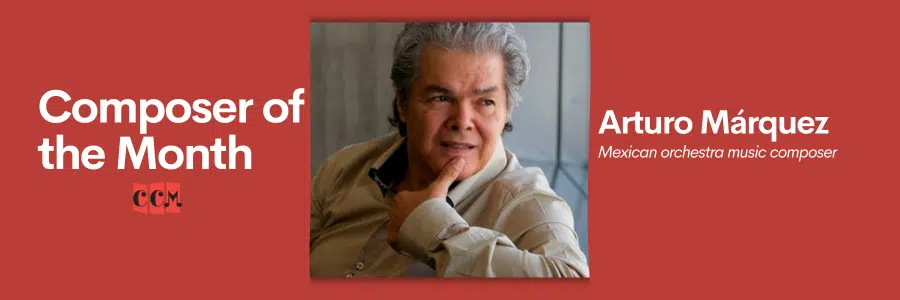September 12, 2024
Arturo Márquez: September Composer of the Month

Arturo Márquez, a name synonymous with the vibrant rhythms and passionate melodies of Latin American music, is our celebrated Composer of the Month for September. He is world renowned for his ability to weave traditional Mexican folk music with orchestral arrangements. Márquez’s compositions offer a dynamic and colorful exploration of cultural identity through music. His works reflect his deep Mexican roots and his innovative approach to classical composition, making him one of the most influential contemporary composers from Latin America.
Early Life and Inspirations
Born on December 20, 1950, in Álamos, Sonora, Mexico, Arturo Márquez was immersed in a world filled with music from a young age. His father was a mariachi musician and his mother a singer, providing the initial sparks for his musical journey. From a household filled with music, Márquez received traditional mariachi, banda, and other regional style influences. These early experiences later impacted his compositional style, embedding the essence of Mexican musical heritage into his classical works. Márquez’s formal music education began at the Mexican Music Conservatory, and he later furthered his composition studies at the California Institute of the Arts.
Márquez’s Music Career
Arturo Márquez’s music career includes a successful blending of traditional Mexican music with orchestral elements. Before returning to Mexico, he studied in the United States and France with composeres Morton Subotnick and Jacques Castérède. Here, he began to experiment more profoundly with incorporating Mexican folkloric themes into his compositions. His works are often characterized by vibrant, rhythmic energy and lush melodic lines, leading to quick recognition. With his national and international acknowledgment, he is established as a key figure in the world of contemporary classical music.
Unique Aspects of His Music
Márquez’s compositions stand out for their rhythmic complexity and melodic richness, drawing heavily from his cultural heritage. One of the defining features of his music is the use of traditional Mexican dance forms, such as the danzón, which is evident in his most famous work, “Danzón No. 2.” This particular piece showcases his skill in transforming folk dance rhythms into sophisticated orchestral textures. Márquez’s music is both accessible and emotionally resonant, thus bridging between classical music audiences and the traditions of Mexican music.
Márquez’s Notable Works and Themes
Among Arturo Márquez’s most celebrated compositions, “Danzón No. 2,” premiered in 1994 is perhaps the most iconic. It has since become a symbol of Mexican music and culture, often likened to the second national anthem of Mexico. His “Conga del Fuego Nuevo” is another significant work, known for its lively and spirited traditional Mexican rhythms. Márquez’s music often explores themes of love, celebration, and national pride, painting an audible picture of Mexico’s rich cultural landscape.
Final Thoughts
Arturo Márquez’s contributions to the world of music extend beyond mere compositions. His works are a celebration of cultural identity. We can rely on Márquez to showcase the power of music to transcend borders and connect hearts. His works continue to inspire new generations of musicians and composers, illustrating that one’s heritage can profoundly enrich classical music. As we celebrate Márquez, we honor his outstanding musical achievements and the vibrant spirit of Mexico. Through his innovative blending of traditional and contemporary elements, Arturo Márquez challenges us to rethink the boundaries of classical music and to appreciate the rich tapestry of sounds that define our world.
Sign up for your FREE lesson at The California Conservatory of Music today!

